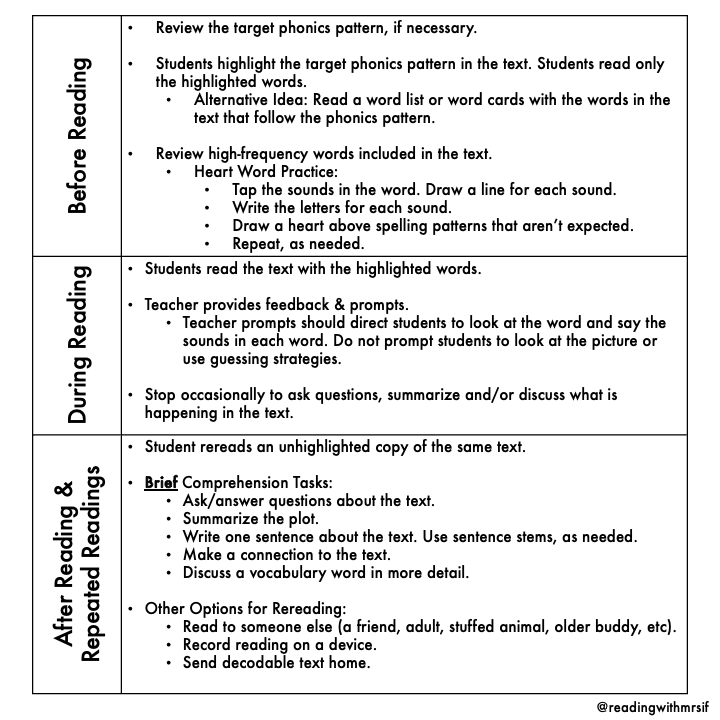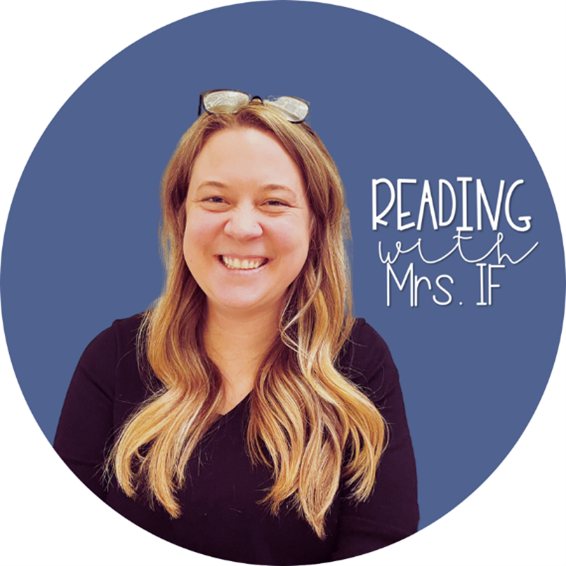

BLOGS > JANUARY 20, 2025
BY HANNAH IRION-FRAKE, K-5 LITERACY COACH

As a former classroom teacher, there are few things as near and dear to my heart as my collection of books. I’d be willing to bet that I’m not alone in that sentiment. But as important as it is to have books in an elementary classroom, it’s equally important to understand where those books fit into instruction in an elementary curriculum. This includes knowing the what, why, and how for authentic texts, hi/lo readers, graphic novels, and decodable text.
Rest assured that all of these types of texts have a place in an elementary classroom. But knowing when to use them falls on the expertise of the teacher.
Decodable texts are an instructional tool that belong in a strong phonics curriculum. Because of this, we often see them in kindergarten, first grade, and second grade classrooms, as well as in reading intervention settings. Decodable texts enable our beginning readers to practice their new decoding skills in an authentic but supportive format, helping them build automaticity with their new phonics skills. But there’s an end to using decodable text. Or, one could argue that all texts become decodable texts once students have become fluent readers!
Once students have the decoding skills to read authentic texts, they should! You can start them off with easier authentic texts, like hi/lo books and graphic novels. Students with the decoding skills to read authentic texts will benefit from ample opportunities to read. This will increase their vocabulary acquisition, build their background knowledge, expose them to more advanced syntax, and support their pattern-learning brain!
But don’t wait until students can read authentic texts to expose them to authentic text. As students are doing the hard work of learning how to read, they should also have opportunities to listen to great authentic texts in the classroom. This will help them practice their listening comprehension and build their oral language capabilities. Read-alouds are a key component in all elementary classrooms, regardless of what kind of texts students are reading on their own.
The way you use a decodable text is different than how you would use authentic text. When using decoding texts, your goal is accurate word reading. You want students to use their sound-symbol knowledge to build strong orthographic knowledge of words. With authentic texts, your goal is comprehension. You want students to develop a deep understanding of the content they’re reading. These different purposes require different approaches for using texts.
To help support word reading, a decodable text routine can be a useful tool for elementary teachers. There are intentional instructional moves you can use before, during, and after reading decodable text. Teachers should explicitly teach the target phonics patterns and then provide lots of opportunities to read and write with that pattern. The image below outlines a strong decodable text routine.

Instruction for comprehension is a more complex topic. Our goal as educators should be to create the conditions for comprehension to occur. To do this, there are also things we can do before, during, and after reading.
I’ll be sharing more about these different types of texts during my webinar, Different Types of Text: The What, Why, and How for Elementary Classrooms, on January 21 at 4pm CT. I hope to see you there! (Hint: you may also use the same link to watch the recording if you missed the live webinar!)
ABOUT THE AUTHOR:

Hannah Irion-Frake is a literacy coach in Central Pennsylvania with over 16 years of classroom experience. She has degrees in Elementary Education, Reading, and Curriculum & Instruction. Hannah is also a Local LETRS Facilitator. She’s a self-proclaimed literacy nerd. Hannah shares passionately about reading at www.readingwithmrsif.com and on Instagram @readingwithmrsif.
Grow confident and capable readers with Follett Content!
Follett can help you motivate and engage striving readers, including reluctant readers and English learners.
Learn more about resources for striving readers.
Are you looking to support striving readers in your school or library? Get a free consultation on how you can support striving readers in your school!
Get Ahead of the 2026 ALA YMAs with These 5 Must-Read Contender Titles
October 22, 2025
This month, we’re diving into the most buzzworthy books of the year – handpicked by our Curation Team from our ALA Youth Media Award Contenders book list. These standout titles are generating serious award chatter, and we’re reading them now to...
Read more
Celebrate holidays with 12 seasonal titles!
October 13, 2025
Motivate students to read with these seasonally themed books from Capstone Publishing! Spark their interest with books focusing on holidays they know and love and give them the chance to discover new ones they’ve never heard of.Three lucky educators will receive these...
Read more
Pippa Park Books Come to Life in Video Series!
September 19, 2025
Middle graders aren’t reading for pleasure like they used to, and educators, booksellers, and families want a solution to get them excited about reading and sharing stories with their peers again. One part of such a solution is to meet...
Read more
Preview exciting fall 2025 eGalleys from Capstone!
September 15, 2025
We’ve partnered with Capstone and NetGalley* to provide digital access to 15 upcoming nonfiction and fiction titles releasing January 1, 2026. You’ll want to take advantage of this early access so you can then preorder the titles you love on...
Read more
Why the Food Group Series Continues to Take the Cake
September 15, 2025
From The Bad Seed to The Smart Cookie, Jory John and Pete Oswald’s Food Group series has become a staple in classrooms and libraries across the country. With its clever characters, laugh-out-loud humor, heartfelt lessons, and captivating illustrations, the series has helped educators...
Read more
Fall Into Reading with Orca Book Publishers
September 15, 2025
Keep students reading all year long by sprucing up your classroom’s library with these top titles from Orca!All the Things We FoundBy Joanne LevyAudience: Upper ElementaryIn this story about loss, protagonist Ruthie finds herself in a park where she meets an...
Read more